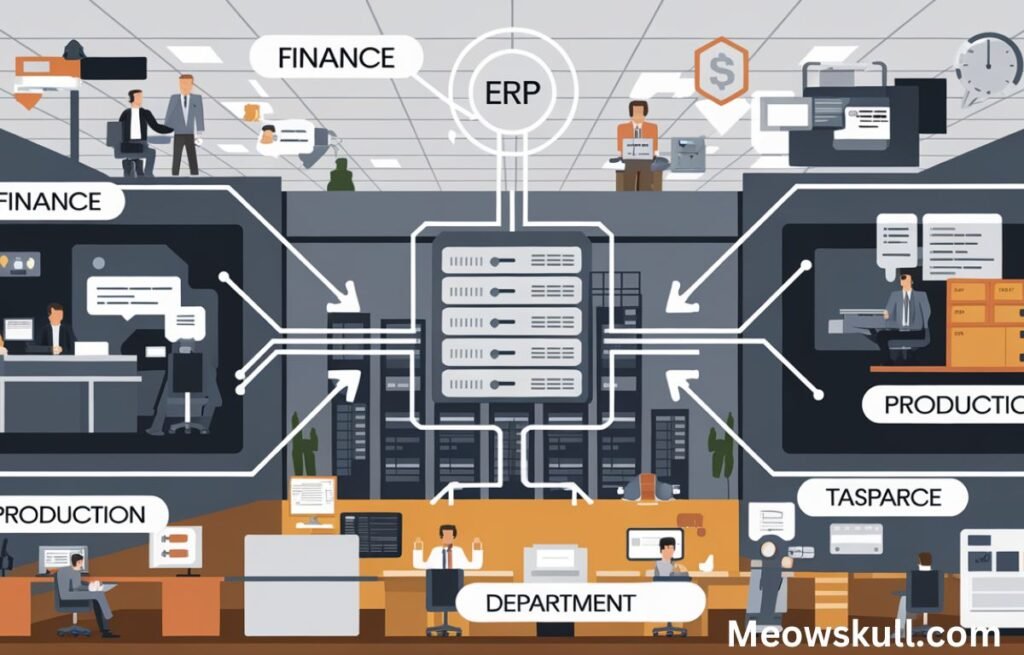Enterprise Resource Planning (ERP) is a vital tool for businesses to manage and integrate their operations. This software helps streamline processes, allowing better coordination across departments like finance, HR, and production. With ERP, companies improve efficiency by automating repetitive tasks, which saves time and reduces human errors.
ERP planificación plays a crucial role in aligning business strategies with operational needs. It ensures the system is tailored to meet specific goals, whether in terms of scalability, customization, or compliance.
Importance of ERP in Modern Businesses
https://noticviralweb.blogspot.com/2024/04/erp-planificacion.html systems are essential in today’s competitive market. They provide real-time data, enabling companies to make informed decisions swiftly. Having a centralized system eliminates data silos, promoting transparency across the business.Moreover, ERP planificación ensures that the system grows with the business, adapting to new challenges and market demands. A flexible ERP can evolve alongside an expanding company, making it a long-term investment.
Key Features of ERP Systems https://noticviralweb.blogspot.com/2024/04/erp-planificacion.html

ERP software typically includes modules for inventory management, customer relationship management (CRM), and supply chain management. Each module integrates seamlessly, providing a comprehensive overview of business operations.
The ERP planificación process ensures that only the necessary modules are selected, avoiding unnecessary complexity. Tailoring the system according to business needs helps in optimizing performance without overloading the system.
Scalability and Flexibility in ERP Planificación
One of the top priorities during https://noticviralweb.blogspot.com/2024/04/erp-planificacion.html is scalability. Businesses should ensure their ERP system can handle growth, whether it’s expanding to new locations or increasing product lines.
Flexible ERP systems allow easy integration of new modules or features without disrupting current operations. This adaptability is crucial for long-term success, ensuring businesses are always equipped to handle new challenges.
ERP and Data Integration https://noticviralweb.blogspot.com/2024/04/erp-planificacion.html
https://noticviralweb.blogspot.com/2024/04/erp-planificacion.html systems bring all business data under one roof. This integration simplifies data management and enhances collaboration across departments. Real-time data access allows for quicker decision-making and improves workflow efficiency.
Effective ERP planificación guarantees smooth integration with existing systems, like accounting or CRM software. Seamless data flow ensures accuracy and consistency, reducing the risk of errors and miscommunication between departments.
Customization in ERP Systems https://noticviralweb.blogspot.com/2024/04/erp-planificacion.html

Every business is unique, and https://noticviralweb.blogspot.com/2024/04/erp-planificacion.html should reflect that. Customizable ERP solutions allow businesses to tweak the software to meet their specific requirements, whether it’s adding custom reports or adjusting workflows.
Custom features ensure that businesses don’t compromise on operational efficiency. By tailoring ERP systems to suit their needs, companies can focus on their core competencies without being hindered by software limitations.
Cost Considerations in ERP Planificación
Cost is a major factor when implementing ERP systems. It’s important to consider not just the initial software price but also the total cost of ownership (TCO), which includes maintenance, updates, and support services.
ERP planificación helps in budgeting effectively. By identifying the necessary features and estimating future expenses, businesses can make a sound financial investment that offers returns in the long term.
ERP and Security Concerns
Data security is a top priority for businesses today. ERP systems often manage sensitive information, including financial data and employee records, making it critical to have robust security measures in place.
During ERP planificación, businesses should prioritize security features such as encryption, role-based access control, and regular audits. This ensures data protection and compliance with industry regulations, safeguarding the company’s assets.
Also Read; Explore nature:5nor5a-vhpg= background
ERP Implementation Challenges

Implementing an ERP system can be a complex process that requires careful planning. Challenges include system integration, data migration, and employee training, all of which can affect the project timeline and budget.
ERP planificación addresses these challenges by preparing businesses for the implementation process. A structured approach ensures a smooth transition, minimizing disruption to ongoing operations and maximizing the system’s benefits.
The Future of ERP Planificación
As technology evolves, ERP systems will continue to innovate, offering more advanced features like AI and machine learning. These capabilities will further streamline operations, making ERP systems more intuitive and predictive.
Future ERP planificación will focus on integrating these emerging technologies, ensuring that businesses remain competitive in a rapidly changing environment. By staying ahead of trends, companies can leverage ERP to drive continuous improvement.
Conclusion https://noticviralweb.blogspot.com/2024/04/erp-planificacion.html
https://noticviralweb.blogspot.com/2024/04/erp-planificacion.html is essential for any business aiming to streamline operations and promote growth. A well-planned ERP system integrates different departments, enhances decision-making with real-time data, and provides scalability for future expansion. Customization, security, and cost considerations are key elements to address during ERP planning. By preparing for potential implementation challenges and future technological advancements, companies can maximize the benefits of their ERP systems and maintain a competitive edge. Proper ERP planificación ensures long-term success and operational efficiency.
FAQs https://noticviralweb.blogspot.com/2024/04/erp-planificacion.html
What is ERP planificación?
ERP planificación refers to the process of designing and implementing an Enterprise Resource Planning system that aligns with a company’s operational and strategic goals. It ensures that the software integrates with business processes and is scalable for future needs.
Why is ERP planificación important for businesses?
ERP planificación is crucial as it allows businesses to streamline operations, improve data management, and increase efficiency. A well-planned ERP system integrates different departments, enhances decision-making, and supports business growth.
What are the key features to consider during ERP planificación?
Key features to consider include scalability, flexibility, data integration, customization options, and security. Businesses should also assess how the ERP system will handle future growth and its ability to integrate with existing software.
How does ERP enhance business efficiency?
ERP systems centralize data, automate repetitive tasks, and provide real-time insights. This streamlines workflows, reduces human error, and enables better coordination across departments, ultimately improving overall business efficiency.
What are common challenges in ERP planificación?
Common challenges include system integration, data migration, employee training, and managing costs. Poor planning can lead to delays and cost overruns, but effective ERP planificación helps avoid these issues.
How does ERP impact data management?
ERP systems centralize and integrate all business data, allowing for easier access, better accuracy, and improved data management. This integration enhances decision-making and promotes transparency across different departments.
Can ERP systems be customized?
Yes, ERP systems can be customized to meet the unique needs of a business. Customization allows companies to add specific features, reports, and workflows that align with their operational requirements, making the system more efficient.
What role does security play in ERP planificación?
Security is critical in ERP systems as they manage sensitive information like financial data and employee records. ERP planificación should prioritize security features like encryption and access control to ensure data protection.
How does ERP contribute to long-term business growth?
ERP systems are designed to be scalable and adaptable, allowing businesses to grow without needing to overhaul their systems. By integrating operations and improving efficiency, ERP supports long-term business expansion.
What is the future of ERP planificación?
The future of ERP planificación involves incorporating advanced technologies like artificial intelligence and machine learning. These innovations will make ERP systems more predictive, improving automation and decision-making for businesses.

As a seasoned contributor to “Meowskull”, Rosalie combines her linguistic prowess with a keen understanding of various topics, ensuring a delightful and informative reading experience. Her articles effortlessly blend clarity, creativity, and a touch of elegance, making language exploration an exciting journey for readers.